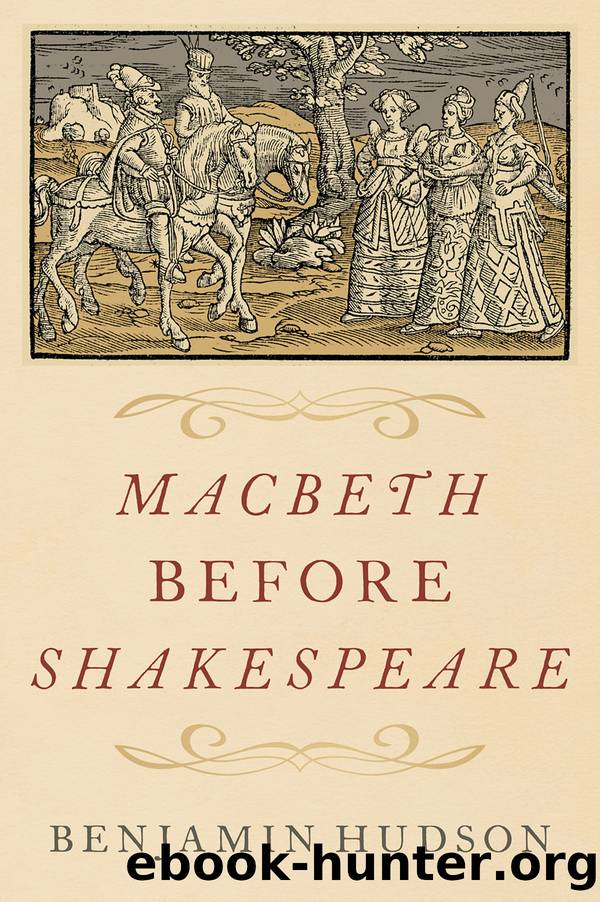Macbeth Before Shakespeare by Benjamin Hudson;

Author:Benjamin Hudson;
Language: eng
Format: epub
Publisher: Oxford University Press USA
Published: 2022-06-15T00:00:00+00:00
7
Macbeth and Renaissance Scotland
If there is an imaginative divide between the works of John of Fordun and Andrew of Wyntoun, there is an equally important intellectual separation between Andrew and the historians who came after him. The renaissance of historical writing in the British Isles that began in the fifteenth century and continued into the sixteenth reveals a keen interest in what is described as the medieval world. That led to curious contradictions. Wealthy merchants whose grandparents had been peasant farmers coveted knighthoods, coats of arms, and other chivalric devices. At the same time, increasingly impoverished aristocrats guarded ever more closely their ancient privileges and titles while they hunted among the despised affluent bourgeoisie for spouses for their children. This revivalism led to the reinterpretation of stories and legends from the Middle Ages. Authors such as Thomas Malory in his La Morte dâArthur contrasted the glamor and religious devotion found in the Arthurian tales with the decadence of his own day. Unmentioned was that the splendor of King Arthurâs court had been as much a fantasy when Geoffrey of Monmouth wrote his History of the Kings of Britain in the twelfth century as it was during the fifteenth century.1
The Macbeth legend increasingly reflected the concerns of its interpreters. For writers in medieval Scotland, this ranged from contacts with Scandinavia to religious controversy. Looking ahead, Macbeth became a foot soldier in the intellectual warfare of the sixteenth century, as conflicting religious identifications combined with equally conflicting theories on the rights and nature of monarchy. This new age saw significant reinterpretations of Macbethâs legend as he was recast into an innovative kind of prince for a different age. John of Fordunâs one-dimensional ogre and Andrew of Wyntounâs devil-sired schizophrenic gave way to an evil sophisticate who was less easy to dismiss simply as a bad man. The medieval warlord/usurper was refined into a political animal with style. The man responsible for creating him was Hector Boece, one of the early leaders of the Scottish Renaissance. His Macbeth was a complicated beast. Part bon vivant, part war hero, but entirely an elusive psychological specimen, this Macbeth was able to command the love and loyalty of many. Equally he was an egotistic, savage tyrant who ruthlessly pursued his own ends. This comes very close to a description of the Renaissance prince, such as King Henry VIII of England. Accompanying Macbeth in his transformation were the supporting characters. Lady Macbeth, in particular, emerges to become the main motivator of the action within three generations of her rescue from oblivion by Andrew of Wyntoun.
Download
This site does not store any files on its server. We only index and link to content provided by other sites. Please contact the content providers to delete copyright contents if any and email us, we'll remove relevant links or contents immediately.
Verus Israel: Study of the Relations Between Christians and Jews in the Roman Empire, AD 135-425 by Marcel Simon(552)
Infocracy by Byung-Chul Han(546)
Caesar Rules: The Emperor in the Changing Roman World (c. 50 BC â AD 565) by Olivier Hekster(532)
Europe, Strategy and Armed Forces by Sven Biscop Jo Coelmont(483)
Banned in the U.S.A. : A Reference Guide to Book Censorship in Schools and Public Libraries by Herbert N. Foerstel(450)
Reading Colonial Japan by Mason Michele;Lee Helen;(446)
Give Me Liberty, Seventh Edition by Foner Eric & DuVal Kathleen & McGirr Lisa(445)
The Roman World 44 BC-AD 180 by Martin Goodman(439)
DS001-THE MAN OF BRONZE by J.R.A(425)
The Dangerous Life and Ideas of Diogenes the Cynic by Jean-Manuel Roubineau(419)
american english file 1 student book 3rd edition by Unknown(416)
The Oxford History of World War II by Richard Overy(415)
Imperial Rome AD 193 - 284 by Ando Clifford(413)
Introducing Christian Ethics by Samuel Wells and Ben Quash with Rebekah Eklund(412)
Basic japanese A grammar and workbook by Unknown(392)
Literary Mathematics by Michael Gavin;(373)
Language Hacking Mandarin by Benny Lewis & Dr. Licheng Gu(353)
How to Reach the 9.0 in IELTS Academic Reading by IELTS Medical(335)
The Oxford History of the Renaissance by Campbell Gordon;(333)
